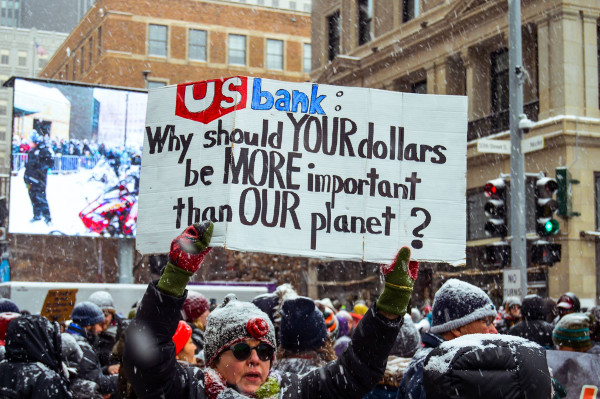
PHOTO/ROB WILSON PHOTOGRAPHY
Minnesota stands in a position to protect one fifth of the nation’s water supply by refusing to let Enbridge Inc. finalize construction on a “replacement” for its aging Line 3 pipeline. Line 3 transports diluted tar sands from Alberta province, Canada, to Superior, Wisconsin. Oil from this pipeline connects with another contested and degrading pipeline called Line 5 that carries its load under the Great Lakes to refineries in other parts of the United States.
Water Protectors in the #MakwaInitiative educate the public and ensure that Minnesota rejects this plan by protesting, taking direct action, participating in hearings, and holding cultural events. On January 12, three Water Protectors from #MakwaInitiative were arrested and held for six hours after locking themselves to the gates and doors of a Wells Fargo Bank in Duluth, Minnesota to heighten awareness of Line 3’s threat and the fact that Wells Fargo has still not divested from Enbridge and its projects.
The pipeline threatens Minnesota’s natural resources which include three of North America’s major watersheds, penetrates the heart of Ojibwe treaty lands, and endangers lakes and wild rice beds sacred to the Anishinabeg.
It also will create an influx of large numbers of workers, often from out of state, who will descend on towns along the pipeline route creating “man camps.” With no connection to the community, workers get paid large sums of money and have little to do in their free time which attracts the drug trade and sex trafficking. Indigenous women are disproportionately at risk of being abducted, murdered, and trafficked in these situations.
The “replacement” pipeline is, in reality, a NEW pipeline, larger than the original and running through a corridor that is many miles from its original corridor at some points. Enbridge plans to increase pipe diameter from 34 to 36 inches and pump twice the volume of oil through it, making it one of the largest crude oil pipelines on the continent, destined to carry up to 760,000 barrels per day. With a cost of $7.5 billion, Line 3 is the largest project in Enbridge’s history.
At this time, Enbridge estimates Line 3 currently has over 900 “integrity anomalies” leaking oil into the soil along its route. These will most likely go unaddressed if it is allowed to abandon Line 3. The original Line 3 is responsible for the largest inland oil spill in Grand Rapids, Michigan in March 1991, pumping 17 million gallons of oil into the Prairie River, a tributary of the Mississippi. This could have poisoned the drinking water of millions downstream if not for the frozen condition of the water. Line 3 was also the source of the Kalamazoo River Oil Spill in 2010, another one of the nation’s worst inland oil spills, pouring 1.1 million gallons of tar sands crude oil into that river. Despite Enbridge’s $1.2 billion attempt to mitigate it, damage still remains.
In April 2018, Minnesota will hear Enbridge’s case. This private corporation transporting oil for privately owned oil companies cannot get the right of eminent domain to violate treaties and take over property without owner consent while being treated as a public utility providing a public benefit.
